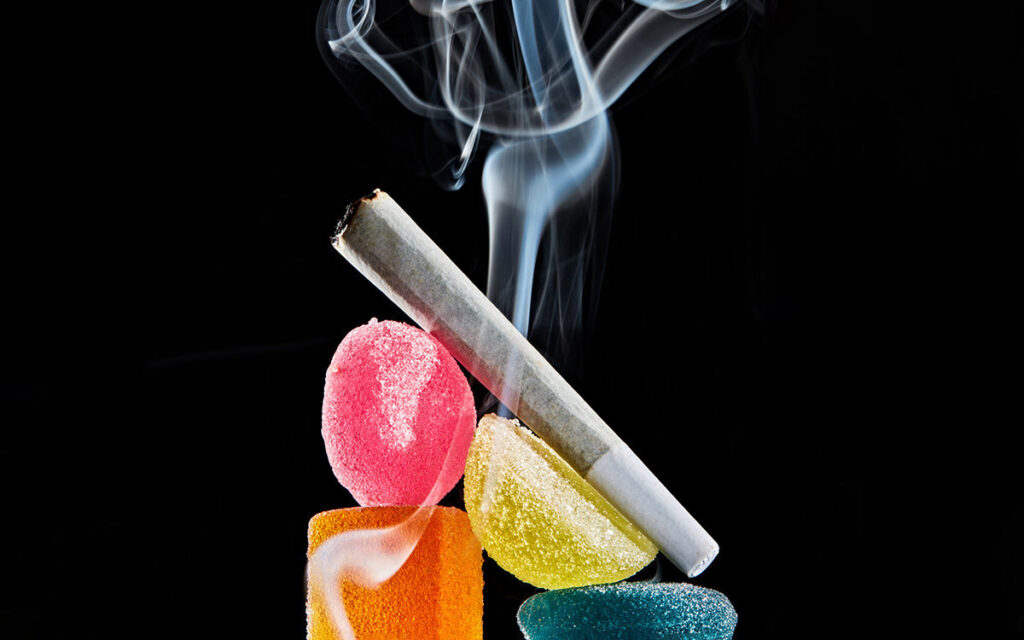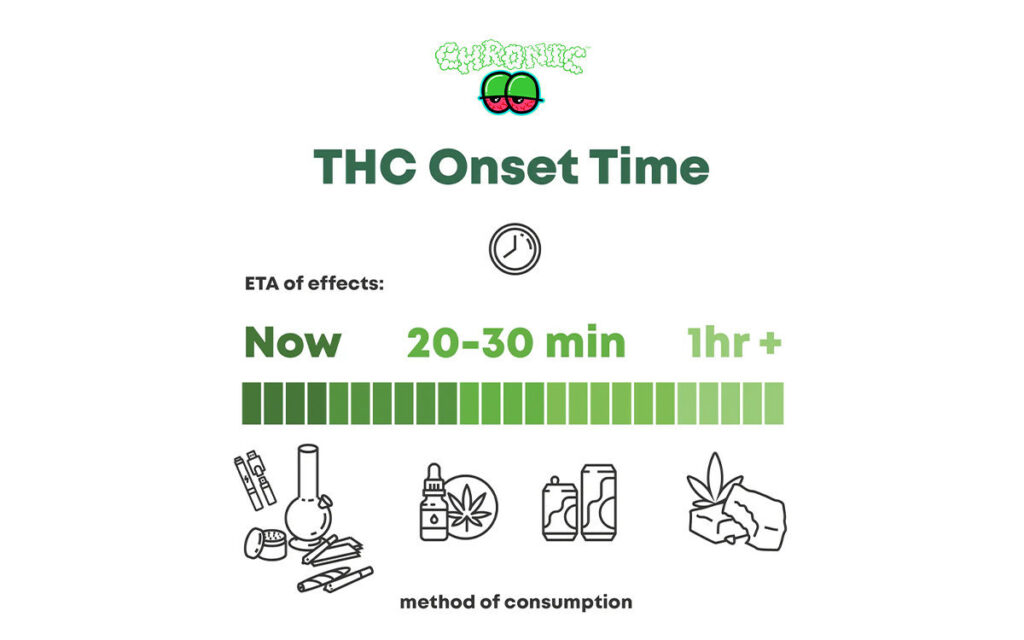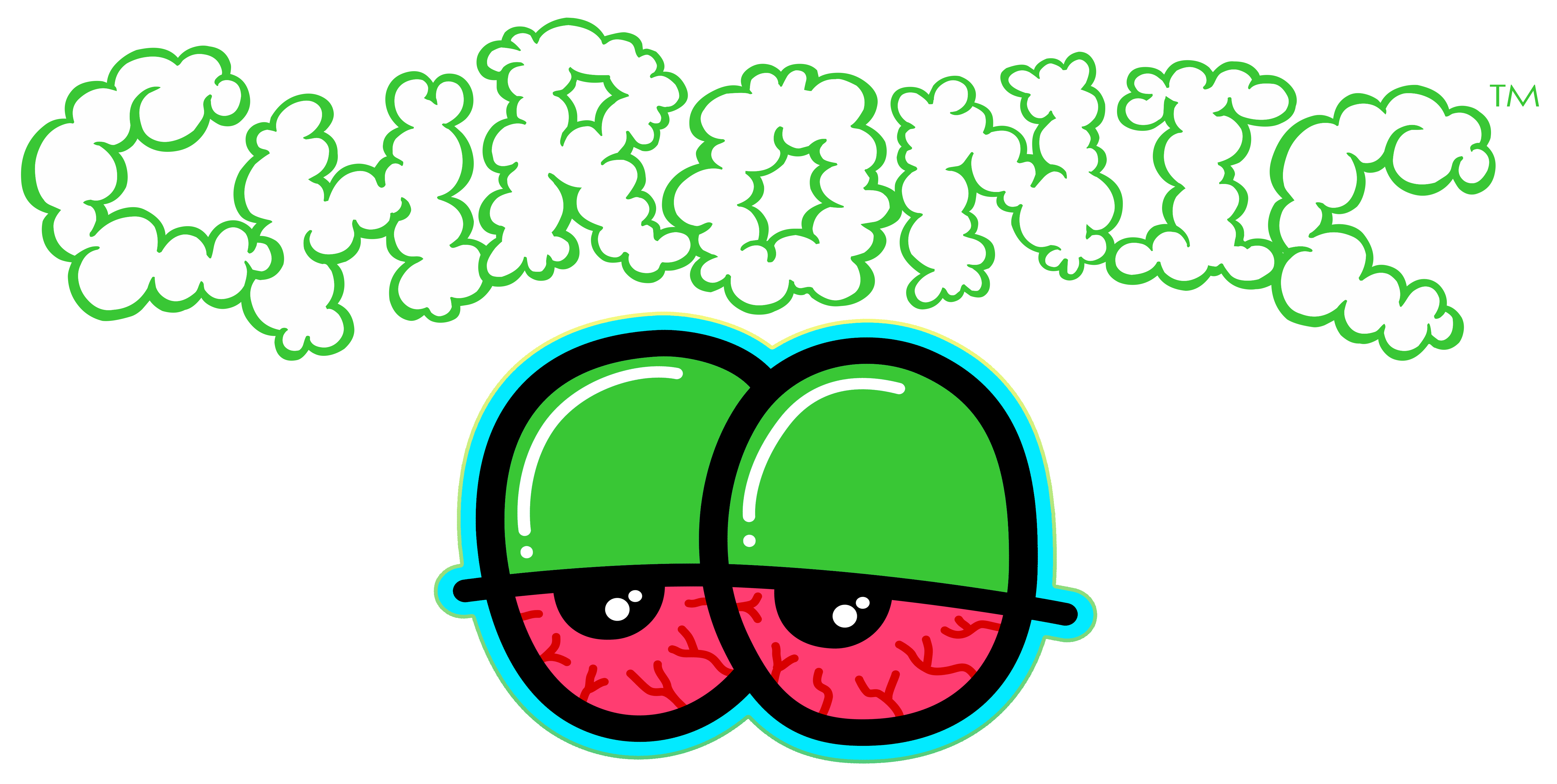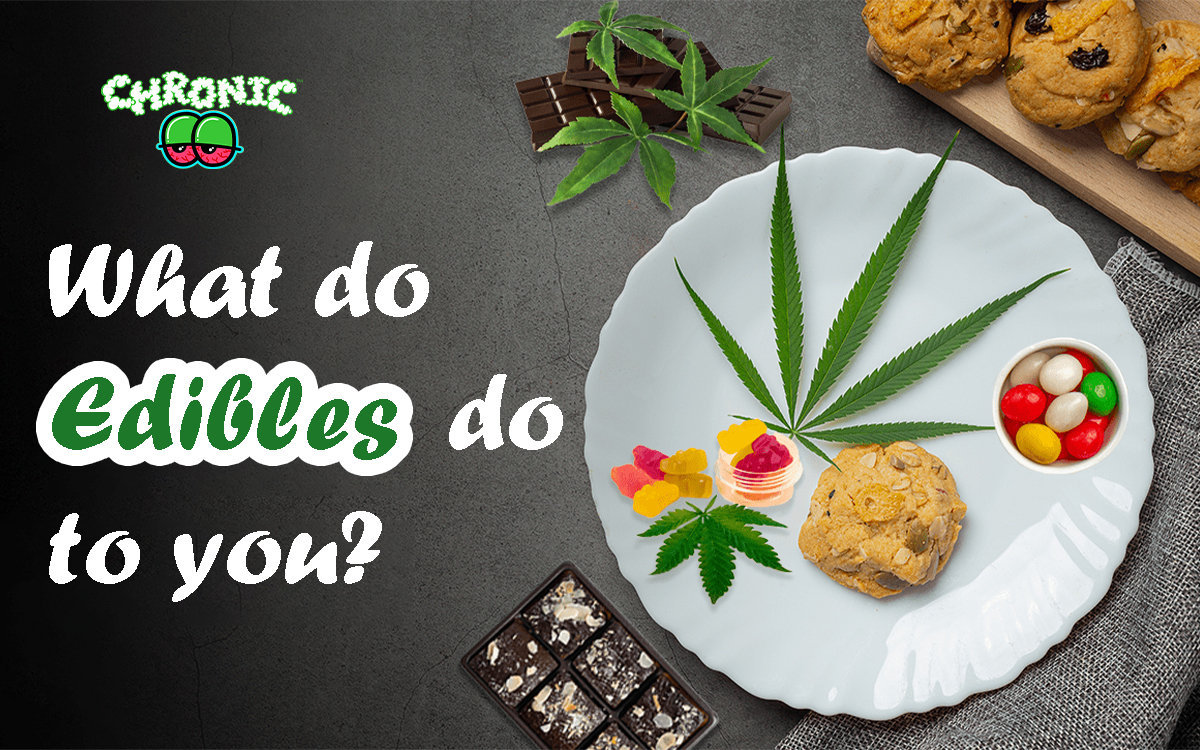Edibles are food items treated with cannabis extracts such as THC or CBD-usually taken for its psychoactive and therapeutic effect respectively. There are a lot of edible products; from candies, chocolates, and baked goods to beverages.
Some advantages make this method one of the hottest topics among people. First of all, edibles are discreet. Longer action: taken as edible, cannabis reaches the liver first, which turns THC into a very potent metabolite of 11-hydroxy-THC.
The effect becomes much stronger and may last from 4 to 8 hours when smoking and vaping give quicker onset but in much shorter duration in comparison. This is also useful in patients who avoid the mode of smoking administration so as not to create respiratory complications or pulmonary damage.
What are edibles?
Edibles are food products that contain active cannabinoids, either tetrahydrocannabinol or cannabidiol, extracted from the cannabis plant. These are manufactured in an amazing variety: gummies, chocolates, brownies, cookies, beverages, candies-even salty snacks.
Arguably the most broad-ranging benefits of edibles are convenience, discretion, and the ability to enjoy the cannabis effect sans smoking or vaporizing. Edibles get digested from the stomach to the intestines, where they get absorbed and become active.

This accounts for the much later onset compared to smoking or vaping cannabis. That said, common times of onset in the case of edibles fall within a bracket of 30 minutes to 2 hours since one’s metabolism, the potency of the product in question, and whether he or she took it on an empty or full stomach are all different.
As far as going forward with edibles, really-the real challenge is in dosing: it’s just so easy to take too much of this stuff and make for some very intense, quite unpleasant experiences.
Generally speaking, a low dose-usually a starting dose-is 5 to10 milligrams of THC, and several hours afterward, one may consider taking more.
What do edibles do to you? Long Explain
They have different types of effects compared to other cannabis products. After digestion THC and CBD create different experiences and lengths of action. It acts right away when reabsorbed from the digestive system directly into the blood and with nutrition is digested into the blood.
In its digestion, it is THC that creates the state of high; it is highly altered. Inside the liver, it gets degraded into ultra-potent 11-hydroxy-THC- which is comparatively much stronger and longer, one should say with regard to THC, which was reabsorbed via the lungs.
Read About: Are THC Gummies legal in the USA?
In comparison, onset is a little bit slower with edibles-it would be more than 30 minutes to two hours before any effects would be felt. Actually, all of this is heavily dependent upon a person’s metabolism, other food in the stomach, and body chemistry. All these effects will last-from anything between 4 and 8 hours, extending up to 12 hours sometimes-depending upon the conditions mentioned above.
On the contrary, cannabis inhalation produces virtually immediate effects which disappear much earlier. Edibles create all manner of experiences. THC in psychoactive varieties elicits euphoria, relaxation, time distortions, and sensory enhancement. A second major cannabinoid, CBD reportedly brings a soothing quality-cutting down anxiety, inflammation, or pain-on its own does not produce any high.
Dosing of Edibles
One problem associated with edibles is dosing. They could feel the first dose did not work at all. Probably the best wager is starting low-usually between 2.5 mg to 5 mg of THC-and waiting two hours at least before taking more.
Edibles are smokeless ways of ingesting the more ‘traditional’ cannabis and can be discreet, though longer-acting. Safety and pleasure do, however, involve dosing with patience and caution.
These are edible food items or drink items, each probably infused with cannabis or herbal extracts. This further extends the application areas both in therapeutic and recreational manners-everything from gummies to chocolates, baked goods, beverages, even to savory snacks.

Whereas with edibles, active ingredients are ingested through digestion. This can take considerably longer than inhalation-anywhere from within a range of 30 minutes to 2 hours-but the high produced can sometimes last considerably longer, often up to 4-8 hours in many cases.
Go low, think 2.5 to 5mg of THC, and wait before ingesting. Other popular and non-psychoactive edibles are those that contain the infusion of CBD. These are favored because of its calming effects. Always store the edibles in a safe place and away from the reach of children or pets.
Is Edibles Illegal in US?
Edibles infused with cannabis are considered illegal in some places within the United States of America due to the fact that the place has different state laws regulated by state and federal law combined.
Because of that, manufacturing, selling, and use are absolutely prohibited at the federal level, though state legislation may give room for other rules and regulations, hence allowing for an extension in the legal use terms regarding cannabis to include edibles.
These states allow edibles, though production and sales controlled by different classes within a class of who can buy them, how many, laws on dosing, and packaging to protect against unintentional ingestions among children.
Also Consider: What Are Infused Pre Rolls? Full Guide for Beginners
The recreational states that went full-blown into the market include California, Colorado, Washington, and Oregon, among others. Most of those states go so far as to drastically regulate who can buy and use edibles through a state-issued medical cannabis card.
In states fully illegal with respect to cannabis, edibles are also illegal.
That per se is not causing a problem where this discussion is concerned; it does present some problems when it involves issues such as banking problems for cannabis business and inter-state commerce.
Pros and Cons of Edibles
Edibles are food products into which cannabis is infused and is absolutely a whole different comparison when considering smoking and vaping cannabis altogether.
Pros of Edibles:
Long-acting: Perhaps the best benefit edibles have is in the duration of the effects. Though taking longer to kick in, the high lasts much longer-sometimes upwards of 4 to 8 hours. This in turn allows for edibles to be used for sustained relief or relaxation.
Discrete usages include that the edibles were pretty discreet to use; they will not cause any strong odors or visible smoke, which is a definite added plus for people who have to medicate either in public or private environments.
No respiratory risks: Edibles are ingested into the human body rather than inhaled; thus, they do not irritate the lungs. They do not present those breathing risks which may be associated with smoking or vaping.
That would make them preferable in cases for health-conscious users, or for people with some sort of predisposed conditions regarding their lungs.
Dosage accuracy: Most of the edibles clearly highlight the dosage in regard to their content for both THC and CBD on their labels.
This goes without saying that it is much easier to keep track of how much a person is consuming since dosage information is right upfront. This can, therefore, be opposed to smoking whereby dosages can be hard to measure.
Cons of Edibles:
One major drawback is Delayed Onset, which occurs with the user. The fact that most non-patient users often consume too much, waiting for it to start hitting and find themselves quite often in an uncomfortable or too-strong high, says it all.
The most common risk experienced with edibles is over-consumption, whereby one consumes more while waiting to feel either strong or uncomfortable. Anxiety, paranoia, and dizziness are other conditions mediated through edibles of high concentrations of THC
Unpredicted digestion: Due to metabolism, stomach content, and biological structure, the real amount of THC reaching the blood may be very different.Hence, edibles are much more unpredictable in their effects.
Options at low calories are beginning to be more available.
Accidental ingestion of edibles can take place since most of them look no different from normal foods, hence there might be a chance of their consumption by kids or pets in ignorance.
Side Effects of Edibles
Cannabis edibles remain some of the most popular ways through which cannabis is taken in, however, few side effects are there that could change consumers view, and these do depend largely upon dosage, a person’s tolerance, and general health.
Common Side Effects
- Onset/Delayed Onset and Duration: The onsets may be in 30 minutes to 2 hours; high lasts for 6-12 hours, sometimes longer. Because of this delay in onset, there are those who take more than they should and probably increase the overdose risk.
- Gastrointestinal problems: There is a possibility of nausea and vomiting abdominal discomfort-mostly with high dosage or with edibles showing much sugar and fat content.
- Impaired cognition: The edibles cause disorientation, reduced ability to remember, and reduce the capability of a person in focusing on things. Time and other realities have distortions recorded by some.
- Anxiety and paranoia: The higher dosages of THC contained in edibles heighten anxiety, paranoia-even panic attacks-among the people who are starters with cannabis or sensitive to THC.
- Drowsiness/Fatigue: Edibles can be of a sedative nature and can be highly somnolent. While this may be a desirable side effect in treating sleep with cannabis, this is highly counterintuitive in daytimes and pre-activities when so much focus is required.
- Increased Heart Rate: THC tends to raise heart rates temporarily; this may raise concern among those suffering from heart conditions which can later result in serious cardiac events.
- Dry Mouth and Dry Eyes: Most common yet harmless but very irritating. Long-term Problems Frequent intake of edibles can result in dependency and development of tolerance.
Also too much use or chronic practice will result in adverse changes to cognitive skills especially to younger consumers whose brains are still at their development stage.
How do smoking and edibles differ?
Of all the modes of administration, two of the most consumed ones are smoked and edible cannabis. They have very important differences in processing by the body, effect, and time of onset and duration.
Onset-duration: The effects of cannabis take a few minutes when smoking or vaping. Active ingredient-THC; because it’s smoked, the chemicals immediately go into the lungs into the bloodstream. It lasts usually 4 to 6 hours after consumption.
Intensity and Metabolism: The very moment cannabis smoke is inhaled, THC directly reaches the blood and gets metabolized through a fairly simple process by the liver. This in turn makes the edibles pretty intense and susceptible to overconsumption because they come in so many forms and ways; it is rather easy to misunderstand how much one has ingested.
In that very factor, it is also about control and dosage. It allows for more immediate control over dosage in smoking, whereby one is able to stop at any moment upon commencement of feeling the effects. In other words, edibles go for a slower and longer high, the effects heavier; for smoking, the onset is fast but of shorter duration.


Pingback: Where Is Edibles Legal? A Guide To All 50 States - Chronic THCA
Pingback: What is Delta-9? Its Effects & Legality - Chronic THCA